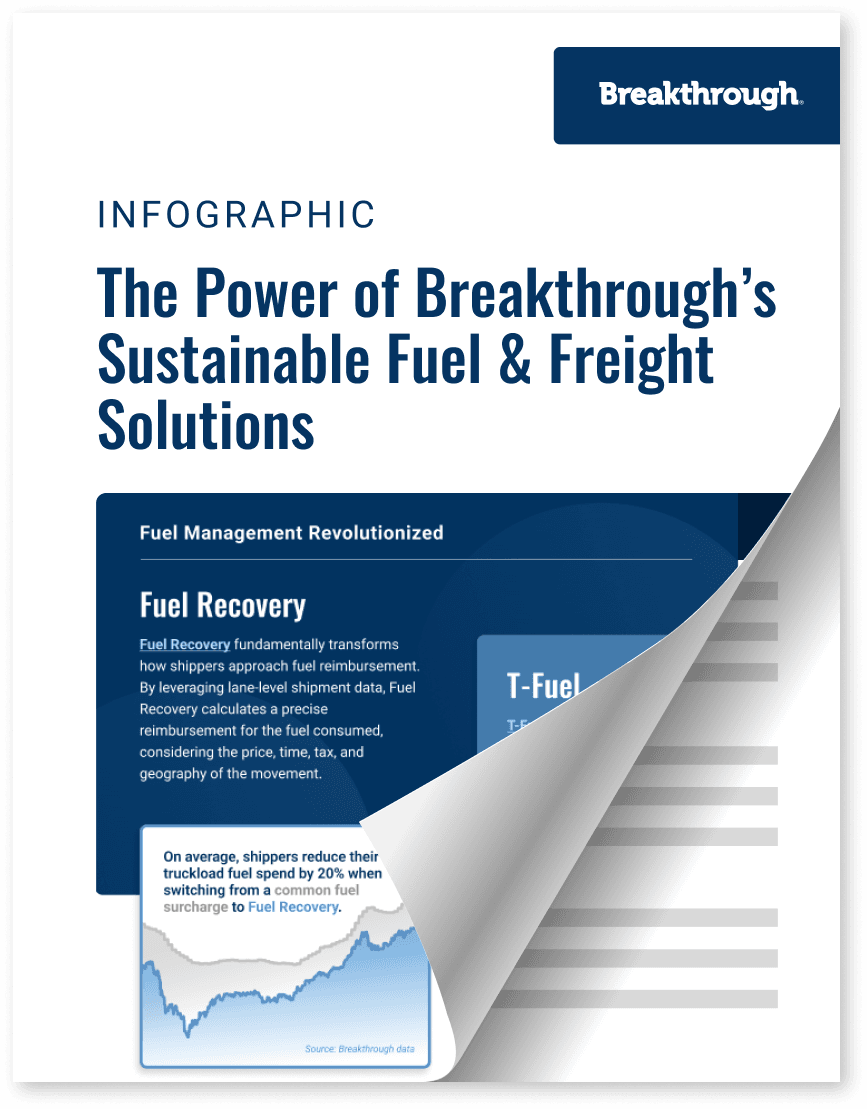The Power of Breakthrough's Sustainable Fuel and Freight Solutions

Freight
3 min read
July 17, 2024
Market Events
4 min read
July 16, 2024
Market Events
3 min read
July 8, 2024

3 min read
January 31, 2023

Share:
Since the onset of COVID-19, energy markets price volatility has increased, and many energy products have reached their lowest and highest prices in history. Crude oil benchmarks traded well over $100 per barrel during the second quarter of 2022 after trading at negative prices just two years prior.
Diesel fuel is a prominent point of discussion in this narrative. The U.S. Energy Information Administration (EIA) published that 2022 ended with the highest cost of retail diesel since 1994. Shippers and carriers are assessing their transportation network strategies to better anticipate market shifts and stay within their budget.
One evident trend the Breakthrough Applied Knowledge team has reported is in more volatile years the spread between the Department of Energy weekly retail diesel index and the price of national wholesale diesel fuel is larger. This was demonstrated by comparing the past three years: 2020, 2021, and 2022. The average diesel fuel spread in 2020 was about 58¢/gallon, 42¢/gallon in 2021, and 57¢/gallon in 2022.
Starting on November 24, 2022 spreads were over 100¢ per gallon for fifteen consecutive business days. COVID lockdowns in China, the Russian crude oil embargo in Europe, and speculation about OPEC+ moves caused significant diesel price movements each day. Shippers who calculate diesel fuel surcharges based on the DOE diesel fuel index method were unable to account for these daily fluctuations – adding to the increase in spreads.
In more volatile years, traditional diesel fuel surcharges inflate the prices shippers reimburse carriers. Shippers can align closer to market realities by using a market-based fuel reimbursement program. This program allowed users to pay an average of $1 per gallon less on fuel for those fifteen consecutive days – and not worry about how they were overpaying carriers throughout the volatile year.
Large spreads have caused ambiguity between shippers and carriers on what is a fair and accurate fuel reimbursement. In 2022, price movements of over 10¢ per gallon occurred on 79 of the 260 business days — 30.4 percent of the time. This had only happened 12 other times in the prior 10 years.
Moving into 2023, energy market volatility is expected to continue. Uncertain market developments including the effectiveness of the European Union’s ban on Russian crude oil and refined products, the commitment and magnitude of OPEC+ crude oil production cuts, and the breadth and depth of slowing economic growth or recessions could add upward or downward price pressure.
To maintain a fair and accurate relationship with carriers, shippers should consider managing their transportation energy spend strategy with a market-based fuel reimbursement. Shippers must be careful not to overpay carriers for their shipments, as diesel costs are expected to remain volatile. This is important to ensure they can transport their goods to market efficiently and effectively each year. Schedule a demo of Fuel Recovery today!

3 min read
July 17, 2024
Maximize transportation efficiency with cohesive fuel and freight strategies. Discover the power of enhanced visibility, cost-effectiveness, and sustainability.
Read more
4 min read
July 16, 2024
Discover how the recent elections in Mexico and the EU are expected to influence energy policies, fuel prices, and dynamics in the transportation sector.
Read more
3 min read
July 8, 2024
Understand the state-specific changes in diesel tax rates and explore strategic solutions for shippers to accurately calculate fuel reimbursements to carriers.
Read more